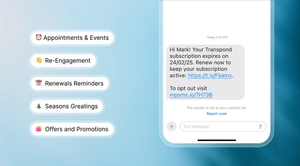Building a website is a great way to get your business the attention you need. Whether you’re showcasing your goods and services, looking to boost your brand presence, or selling online, a website is a great place to start.
You used to need extensive technical knowledge to build a basic website meaning small businesses either had to outsource the process or hire a developer. Fortunately, this is no longer the case. Website builders allow you to create your website without needing external help.
From intuitive features to a user-friendly interface, we’ve collated a list of the best website builders on the market to help you make the right decision.
What makes a good website builder?
As a small business, you have different needs and resources than a larger organization. When considering a website builder you need to prioritize the following elements to ensure you get the right tool for you and your team.
Simple to use
Unlike larger businesses, smaller teams don't have the budget for a dedicated developer. That's why you need a website builder that offers a no-code solution to set up and manage your site.
Many website builders have drag-and-drop functionality allowing you to add text, images, and other elements quickly and easily. A good small business website builder should offer a variety of professional templates that you can alter and adjust to suit your brand and industry. This allows you to create a polished and professional look without needing a designer.
Affordability and value for money
As a small business owner, you know what it's like to work within a tight budget, so the right website builder mustbe cost-effective and great value for money. Look for a site builder that provides essential features like a custom domain or prebuilt templates. While other perks like unlimited storage are great perks they can come at an additional cost.
Many website builders offer tiered pricing so you can find a price that suits your budget and needs. Before choosing a plan consider signing up for a free trial or free plan to help you test the capabilities of different website builders before making a final decision.
E-commerce capabilities
To create an online store you need a business website with e-commerce tools. While most of the best website builders have rudimentary e-commerce functionality, you want to ensure that whatever website builder you choose has a full range of essential e-commerce features. This includes inventory management tools, secure payment processing, and customizable product pages.
More advanced website builders offer additional features like abandoned cart recovery and discount code creation to help improve your store functionality and drive sales. Additionally, many builders now incorporate AI tools that facilitate quick and easy website creation and assist in content generation, making it easier for users with limited technical knowledge to build functional websites. Ensure you have the basic e-commerce tools first before looking for add-ons. The best website builders should support various payment gateways so customers can easily pay using their preferred method.
SEO and marketing tools
A website builder with built-in search engine optimization and marketing tools is essential for any small business selling online via an online store. The key features to look for are the ability to add custom meta tags, adjust URLs, and optimize your images.
The best website builders integrate and support additional marketing tools like email marketing, social media sharing, and blog creation, helping you reach a broader audience. Some builders provide advanced features like dashboard reporting that connect your data from Google Analytics, so you can track your site traffic and use behavior.

Mobile responsiveness
Over 60% of web traffic comes from mobile devices, so your website must look and function well on both phones and tablets. When looking for a website builder, choose one that automatically optimizes your site to ensure all visitors have a seamless experience.
Using software that automatically optimizes your site can improve user satisfaction and make it easier for readers to access the information they need. It can also benefit your search engine rankings as Google favors sites that are accessible for mobile devices.
Customer support
You'll likely run into a few problems when building and managing your website. The best website builder for small businesses should provide comprehensive support through multiple channels like live chat, email, or phone. This level of reassurance is great, especially in the early stages of website building.
Many website builders provide comprehensive knowledge bases that include tutorials and community forums. These allow you to troubleshoot common issues without waiting for guidance from a customer support team.
Scalability and integrations
As your business grows, your website should grow with it. Whether it's adding more pages or needing unlimited storage, choosing a website builder with multiple tiers can help you grow your functionality.
A good website builder should integrate with other essential tools to your day-to-day operations. Check if your builders can work alongside third-party apps like CRM software, booking systems, or accounting and reporting tools. This ensures that everything runs seamlessly and limits the amount of intervention needed by you or your staff.
Security and reliability
Data security on your site is an essential non-negotiable, especially if you're an online store. Look for a website builder that offers SSL certificates for secure browsing and also promises regular backups and robust hosting to prevent downtime.
These security features help protect your business data and customer information. These layers of security create trust and credibility in your brand helping as customers will feel you’re site is safe and secure.
The best website builders for small businesses
WordPress
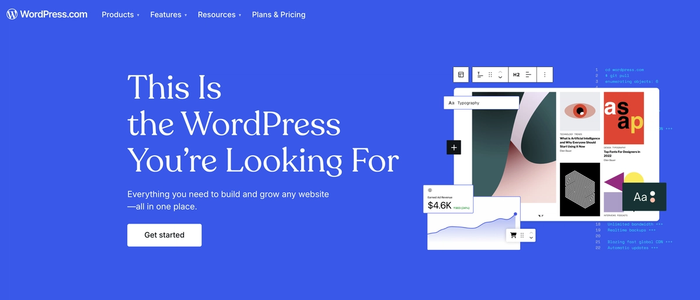
Functionality and features
WordPress is a highly customizable website builder with over 30,000 themes and 70,000 plugins, allowing users to create anything from a simple blog to a complex e-commerce store. As an open-source platform, it offers complete control over website functionality, with extensive plugins for SEO, social media integration, and e-commerce.
Cost
While the core WordPress software is free, users must pay for hosting and premium plugins or themes. Hosting starts as low as $3.87 per month, making it a cost-effective solution, especially for small businesses and startups. With flexible, tiered pricing, users pay only for the specific features they need—ideal for those on a budget looking for a functional website.
Longevity
As the world’s most popular website builder (powering 43.2% of all websites), WordPress receives regular updates to keep it secure and compatible with changing tech standards, allowing it to handle high traffic. With thousands of plugins, WordPress can scale easily alongside a growing business. Its popularity also means users benefit from a vast support community and knowledge base, with abundant tutorials, forums, and troubleshooting resources readily available.
Complexity to Implement
Implementing a WordPress site varies in complexity based on your specific customization needs. Basic setups with simple themes are beginner-friendly, but sites with advanced customizations, complex plugins, and e-commerce features require more technical knowledge.
While WordPress provides a large knowledge base and community support, navigating these resources may take some initial effort. However, over time, these knowledge bases can be essential for addressing technical challenges and developing your platform knowledge.
Pros
- High customizability – WordPress provides tens of thousands of themes and plugins making it suitable for a range of purposes.
- Affordable and scalable – Its free core software has enough tools to help you get started and premium add-ons start at a low price.
- Large support community – They have an active community of users who provide each other with great resources and guidance.
Cons
- Can be complex for beginners – Complex sites require some technical expertise to get up and running, especially if you need multiple plugins.
- Require third-party plugins – While plugins enhance functionality, they may require frequent updates and the tools could conflict with each other.
- Security vulnerabilities – The open-source design and popularity of WordPress make it a target for hackers; users need to stay updated and apply security plugins.
Score: 9/10 Great all-round solution for anyone wanting to build a simple functioning site quickly and cheaply.
Wix
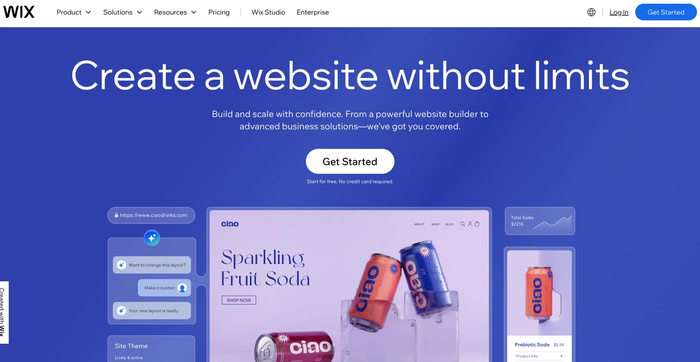
Functionality and features
The intuitive drag-and-drop builder, allows users to create professional, customized websites without complex technical skills. With hundreds of industry-specific templates, Wix makes it easy to build a branded website. The platform provides essential tools for small businesses, including SEO, e-commerce, appointment booking, and blogging.
Its app market offers add-ons like payment processing, email marketing, and CRM integrations, enabling businesses to expand functionality as they grow. Wix also includes mobile optimization and reliable hosting, ensuring a seamless experience for users and their audiences.
Cost
Wix offers a range of pricing plans to fit different business needs. The basic plan starts at $11.60 per month, providing hosting for 2GB of data and access for 2 users, while the Business Elite plan offers unlimited storage and up to 15 users for $150.40 per month. These flexible options make Wix an affordable choice for small businesses, balancing simplicity and essential features without high upfront costs.
Longevity
Wix can scale alongside your business due to its ability to scale through add-ons and integrations. Its app market and ongoing updates allow businesses to easily enhance functionality over time, making Wix adaptable as business needs evolve. The platform’s reliable hosting and mobile optimization also help ensure Wix websites are up-to-date with the latest web trends.
Complexity to implement
The platform is designed to be beginner-friendly, requiring no coding skills. This simplicity allows users to quickly set up a site that suits their needs. For more advanced needs, Wix’s app market offers various add-ons that integrate well, though adding complex features may still require a learning curve. Overall, the platform’s ease of use and available support make it accessible for users with little to no technical expertise.
Pros of Wix:
- Beginner-friendly – Wix's intuitive features allow users to create professional websites without technical skills.
- Scalable and flexible – The platform’s app market and ongoing updates allow businesses to scale easily, adding features like payment processing, CRM, and e-commerce tools.
- Tiered pricing – With flexible pricing plans, Wix offers a range of options with essential tools, starting from just $11.60 per month.
Cons of Wix:
- Limited storage on lower plans – The most affordable plan offers just 2MB of data and access for only 2 users, which may not be sufficient.
- Can be a learning curve – While the platform is beginner-friendly, integrating complex features and add-ons may require some technical knowledge.
- Expensive advanced plans – The most advanced plan costs $153.37 per month, which may be costly for some small businesses.
Score: 7/10
Wix is ideal for anyone who wants to expand their current site and can use the unlimited storage and advanced feature options.
Squarespace

Functionality and Features
Squarespace offers sleek, professional templates that are easy to customize, making it ideal for small businesses looking to create visually appealing websites with minimal technical skills. It includes built-in SEO tools, blogging capabilities, and appointment scheduling tools, along with an all-in-one service that provides hosting, domain registration, and SSL security.
Squarespace also integrates with analytics, social media, and email marketing tools to streamline business operations. Reliable customer support is available to help businesses manage and grow their online presence.
Cost
Squarespace offers several pricing plans, with the cheapest starting at $20.63 per month. Each tier includes hosting, free domain registration and SSL security and users can save up to 25% by paying annually. While more expensive than other website builders, Squarespace offers a 14-day free trial, allowing users to explore advanced features before committing.
Longevity
Squarespace's all-in-one approach and scalability make it a strong choice for long-term growth. It seamlessly integrates with tools like Google Analytics and email marketing platforms, allowing it to support businesses as they expand. The platform’s ease of use and customer support help businesses maintain and improve their online presence.
Complexity to implement
Squarespace is beginner-friendly, with an intuitive drag-and-drop interface for quick setup. However, as businesses grow and require more advanced features, there may be a learning curve, especially when customizing templates or integrating third-party tools.
Pros:
- Professional design templates – Squarespace offers sleek, professional templates that are easy to customize for businesses looking for a high-quality website.
- All-in-one service – The platform includes hosting, domain registration, and SSL security, simplifying the website setup and management process.
- Good customer support – Reliable support ensures businesses can manage and scale their online presence with consistent support.
Cons:
- Higher cost – Squarespace tends to be more expensive compared to other website builders, especially for advanced features and plans.
- Limited customization – While the platform is easy to use, advanced customizations are limited compared to other platforms
- Complex features – Additional features can be complex to implement, presenting a steep learning curve for anyone who isn’t tech-savvy.
Score: 8/10
A good choice for businesses looking for an all-in-one platform and ready to make an annual commitment to a website-building platform.
Shopify
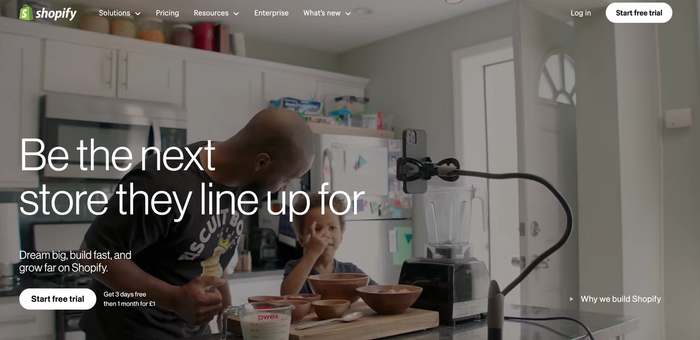
Functionality and features
Shopify’s website builder is a no-code solution specifically designed to create comprehensive e-commerce sites. It provides small business owners with the tools they need to manage inventory, process payments and customize visuals.
Shopify has a variety of templates to choose from, drag-and-drop editing tools and an integrated checkout system making it easy to set up your own online store.
It offers built-in payment processing tools and its extensive app market lets you add social media, email marketing, and SEO tools helping you to reach a wider audience.
Their 24/7 customer support also ensures you have the resources you need if you have issues.
Cost
Shopify offers multiple pricing plans based on the features you need. Starting at $32.33 a month, with an additional discount for annual plans, the basic package includes web hosting, payment processing, product and informational pages, and a blog section.
More advanced plans range from $333.80 and upwards depending on your specific needs making it one of the more expensive website builders.
However, they offer a free trial and their extensive e-commerce functionalities are worthwhile for anyone who conducts most of their business through their online store.
Longevity
Shopify is designed to support long-term growth, with scalable tools and a vast app market that allows businesses to expand as needed. Its e-commerce-focused features like inventory management, payment processing, and marketing integrations ensure that businesses can keep up with growth and evolving online selling needs. Shopify’s continuous updates and robust support infrastructure also make it a reliable choice for long-term use.
Complexity to implement
Shopify is easy for beginning focused on an e-commerce solution. The intuitive editor and built-in templates help simplify the setup process, but more advanced features may need more technical skills to implement. Shopify’s support resources help bridge this knowledge gap but it could take time to fully master it.
Pros:
- E-commerce focused – Shopify is specifically designed to help users create and manage online stores and has good tools for product management, payment processing, and inventory.
- Extensive app market – Shopify offers a wide range of apps to improve functionality like customer service, SEO, and marketing integrations.
- 24/7 customer support – Customer support is always available to provide your business with the help and infrastructure it needs to succeed.
Cons:
- Pricier option – Shopify plans start at $32.22 per month, making it one of the more expensive website builders.
- Complex advanced features – While the basic setup is easy, advanced customizations and integrations may require additional learning or technical expertise.
- Transaction fees – Shopify charges transaction fees which can add to the overall cost of running a store.
Score: 7/10
If your business primarily sells online and you’re looking for e-commerce functionalities then Shopify may be for you, but be aware of hidden transactional costs and hidden fees.
Web.com
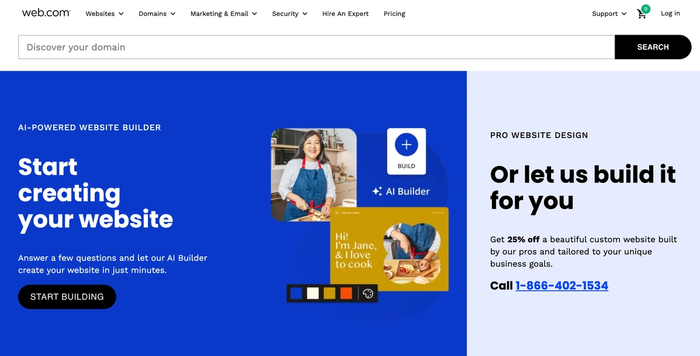
Functionality and features
Web.com is a website builder and digital marketing service designed for small businesses. It offers AI-powered website building, customizable templates, logo design tools, free domain registration, and e-commerce features.
The platform is user-friendly, requiring no coding expertise, and includes hosting services along with marketing features like SEO and social media management tools to help businesses drive traffic.
In-house tech support is available for setup, troubleshooting, and customer assistance.
Cost
Web.com offers pricing plans ranging from $19.99 to $34.99 per month, with discounts for annual subscriptions. Despite its affordable pricing, each plan includes one free hour of expert design support, typically valued at $99, making it a cost-effective option for businesses wanting to get started quickly.
Longevity
The website builder can support long-term growth as it has essential tools for expanding your online presence. E-commerce and integrated marketing features let you reach a broader audience and the user-friendly interface helps you make changes to your site quickly.
The built-in SEO and social media management tools make it a good option for businesses seeking to improve their visibility and expand their digital footprint.
Complexity to implement
As a beginner-friendly solution, the easy-to-use interface requires no coding expertise. Web.com has many customizable templates, making it easy to build a professional-looking website quickly and efficiently.
Users seeking more advanced customizations or features might struggle to implement them without advanced web skills.
However, Web.com provides helpful in-house tech support to assist with setup and troubleshooting, making it accessible for users at all technical levels.
Pros:
- User-friendly – Web.com’s simple interface and customizable templates are great for beginners who lack coding skills.
- Affordable – Web.com offers budget-friendly pricing, making it an accessible option for small businesses looking to get online quickly.
- Integrated marketing features – Built-in SEO and social media management tools help businesses expand their reach and visibility online.
Cons:
- Limited customization – While Web.com is easy to use, offers fewer advanced customization options than other website builders.
- Basic e-commerce features – Web.com has less advanced e-commerce features compared to Shopify, meaning isn’t ideal for larger more complex online stores.
- Lack of additional plug-ins– Web.com is best suited for small businesses as it lacks the scalability needed by larger businesses with complex needs.
Score: 6/10
Affordable and user-friendly but limited plugins and limited customization options hamper Web.com’s scalability.
SpreadSimple
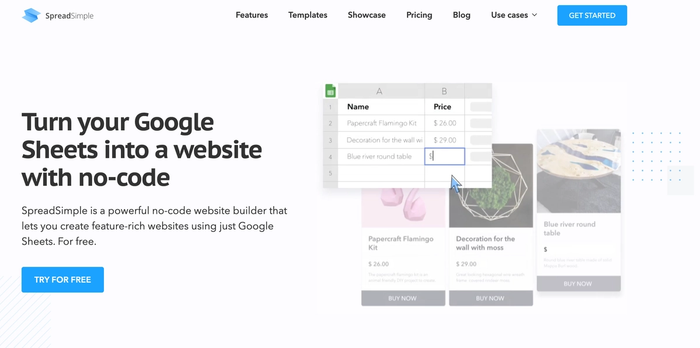
Functionality and features
SpreadSimple website builder helps small businesses to create websites directly from Google Sheets.
Users can design and manage their websites by altering the data in their sheets removing the need for coding or technical expertise.
It’s ideal for businesses looking to showcase a large product catalog, manage their inventory, and create new pages quickly and easily.
The platform includes features like search, sorting, and filtering as well as e-commerce tools like checkout and order forms making it a good option for online sellers.
It also offers third-party integrations with CRM systems and Google Analytics helping users to understand and streamline their customer data management.
Cost
SpreadSimple offers a cost-effective solution, with its Starter plan priced at just $17.90, and additional discounts available for annual subscriptions.
By integrating with free tools like Google Sheets, SpreadSimple minimizes setup and ongoing management costs, eliminating the need for expensive third-party apps and making it an affordable option for small businesses.
For more advanced features like payment options, customer accounts, extensions, and add-ons, you must upgrade to the pricier tiers that may cost up to $30 per month.
Longevity
SpreadSimple’s longevity is dependent on its integration with Google Sheets. As long as businesses continue using Google Sheets for data management, SpreadSimple offers a sustainable and adaptable platform.
However, for businesses with more complex needs, additional customizations might eventually be needed to keep up with growth.
Complexity to implement
SpreadSimple is designed to be user-friendly, making it an ideal choice for businesses looking for a straightforward website builder.
The intuitive interface allows non-technical users to create and maintain their site via Google Sheets but this process makes it tricky to implement more advanced customizations. If you’re interested in integrating with third-party tools you may need a more complex system.
Pros:
- No coding required – The platform is designed for non-technical users, allowing businesses to build and update websites easily through Google Sheets.
- Cost-effective – SpreadSimple can solve many issues usually fixed by a web developer, helping reduce overall website costs.
- Real-time updates – Websites can be updated instantly by editing your linked Google Sheets, simplifying product and inventory management.
Cons:
- Limited customization – While suitable for simple websites, SpreadSimple can’t create highly customized sites.
- Dependent on Google Sheets – SpreadSimple relies heavily on Google Sheets, which is limiting for businesses that require more robust database management.
- Scalability concerns – While great for small businesses, it may not scale well for larger companies with more complex needs.
Score: 5/10
Ideal for solopreneurs with little to no technical skills. But as your business grows you may begin to struggle with limited features.
Hostinger
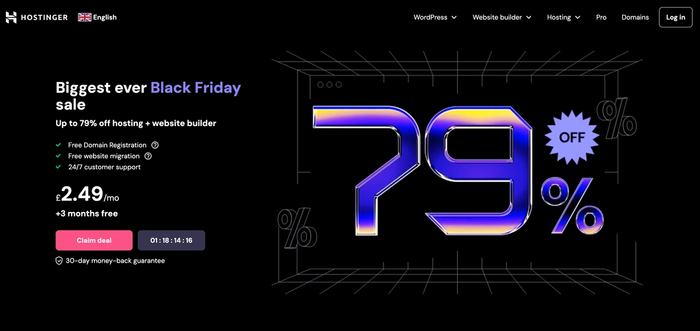
Functionality and features
Hostinger is a budget-friendly web hosting provider known for its reliable performance and essential security features. The platform includes a simple-to-use control panel, called the hPanel, which makes it easy for non-technical users to manage website features.
Hostinger also offers one-click installs for popular CMS platforms and integration with Google Analytics for tracking site performance.
Additionally, Hostinger provides high uptime, fast loading speeds, global data centers, and supports e-commerce platforms like WooCommerce, making it a practical choice for businesses looking to scale their online presence.
Cost
Hostinger offers competitive pricing, with its premium plan starting at $11.99 per month, which includes 100GB of SSD storage, a free domain, and weekly backups. The higher-tier plan, priced at $24.99 a month, provides 200GB of storage, daily backups, and a dedicated IP address. They also offer additional discounts for annual subscriptions.
Longevity
Hostinger’s scalable hosting plans and wide range of features make it a strong choice for businesses seeking long-term growth. The platform’s robust uptime, fast loading speeds, and 24/7 live chat support ensure ongoing performance and support as your business grows. With the flexibility to accommodate e-commerce platforms, Hostinger is well-suited for small businesses that want to steadily grow.
Complexity to implement
Hostinger is designed to be user-friendly, and its built-in tools help simplify website management. Its one-click installs and easy integrations make setup straightforward, even for beginners.
However, advanced features may still take time to understand, especially if you’re unfamiliar with hosting management. 24/7 support is available to assist users with more complex tasks but priority is given to those on higher plans.
Pros:
- Generous storage on basic plans – Hostinger’s basic plan offers 100GB of SSD storage, which is more storage than many competitors' basic plans.
- User-friendly interface – The intuitive hPanel simplifies website management, making it more accessible for non-technical users.
- Reliable performance – Hostinger has high uptime, fast loading speeds, and 24/7 live chat support, ensuring site reliability.
Cons:
- Priority support on higher plans only – Priority support is only available on the higher-priced plans, which may be a drawback for businesses on basic plans when you need immediate assistance.
- Learning curve for advanced features – Their built-in features like the hPanel may take some time to master, especially if you’re a beginner.
- Extra cost for daily backups – Only the top package receives daily backups. Businesses needing them more than once a week must subscribe to a pricier package.
Score: 7/10
Hostinger is budget-friendly and simple to use with a reliable performance record. However, it doesn’t have as comprehensive customer support compared to other solutions on this list.
GoDaddy's Website Builder
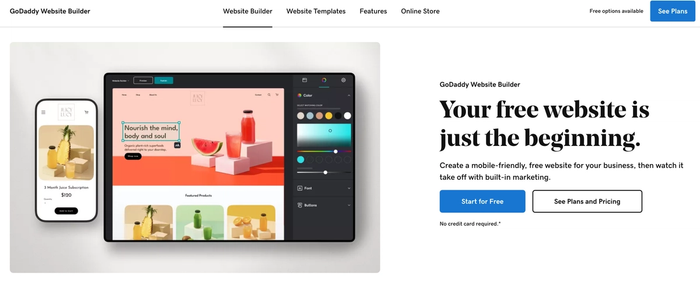
Functionality and Features
GoDaddy’s website builder provides a streamlined way for small businesses to create and manage their sites. The drag-and-drop editor enables users without technical expertise to design professional-looking websites.
Integrated with GoDaddy’s domain and hosting services, it centralizes all website setup and maintenance. The builder also includes marketing tools like SEO, email marketing, and social media integration to help businesses track engagement and reach their audience.
For e-commerce, GoDaddy provides tools for online store management, including inventory, payment processing, and shipping.
Cost
GoDaddy’s pricing depends on your specific site needs. Their cheapest option starts at $10.30 a month making it one of the cheapest options available. It allows you to connect a custom domain, use its content and design tools, and helps you to connect unlimited social media platforms.
To access their e-commerce tools you may need to upgrade to their more advanced packages, however, these are still very affordable with their most expensive option starting at $18.03.
Longevity
GoDaddy is a well-established name in the web hosting and domain industry, giving it credibility that lends to its longevity and reliability as a website builder. The platform is regularly updated to meet current web standards and introduce new features, ensuring long-term compatibility and support for users.
Complexity to implement
Designed to be highly accessible, GoDaddy’s website builder features a drag-and-drop interface that makes it user-friendly, especially for beginners.
Integration with GoDaddy’s domain and hosting services streamlines setup for those already using GoDaddy.
While most aspects of the builder are straightforward, users who are new to e-commerce might experience a slight learning curve when setting up online store functionalities.
Pros
- Easy to use: The drag-and-drop interface is ideal for beginners with no coding skills.
- All-in-one solution: Combines website building, domain management, and hosting, simplifying management for small business owners.
- Comprehensive support: 24/7 customer support assists whenever needed.
Cons
- Limited customization: Design customization options can be limited compared to other advanced platforms.
- May have to upgrade: Some advanced features, like full e-commerce capabilities, require higher-cost premium plans.
- Dependence on GoDaddy systems: Users may feel locked into GoDaddy services for hosting and domain management.
Score: 7/10
GoDaddy is a great option for businesses looking for an all-in-one solution. However, anyone seeking advanced features, especially concerning e-commerce may find the platform limiting.
Strikingly
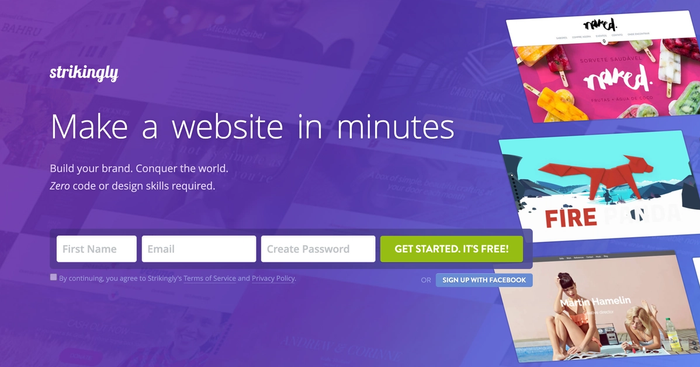
Functionality and features
Strikingly is built for small businesses that need a quick, professional online presence. It provides a simple, intuitive interface, enabling users to build websites without coding knowledge.
Strikingly offers a selection of customizable, professionally designed templates that look polished on mobile and desktop devices.
Key features include built-in SEO tools, social media integration, and analytics, allowing businesses to enhance visibility and track performance.
Basic e-commerce functionality supports online product sales, making it ideal for smaller stores or businesses with straightforward e-commerce needs.
Cost
Strikingly’s basic plan is extremely affordable, costing only $8 per month (billed annually). While you receive a free domain for the first year you’re limited when considering storage with only 1GB of per site and 50GB bandwidth.
The VIP option is pricier at $49 a month but it is much better suited for larger businesses. With 100GB of storage, unlimited bandwidth, and priority customer support this is a better option for businesses with larger and more complex sites.
Longevity
Strikingly is a growing platform with a reputation for simplicity and reliability. The platform receives regular updates to keep pace with current web standards and add features, supporting long-term usability for small businesses.
Complexity to implement
Strikingly is designed to be extremely user-friendly, with simple features that make things easy for non-technical users. Most businesses can launch a basic website in minutes, making it an excellent option for rapid deployment.
While the platform’s eCommerce options are intuitive, they may not be as advanced as those offered by other platforms, making it best suited for smaller or simpler online stores.
Pros
- User-friendly interface: Strikingly's intuitive design enables non-technical users to quickly build a professional website without coding knowledge.
- Affordable pricing: The basic plan is budget-friendly at $8 per month, providing small businesses with an affordable website-building solution.
- Mobile-responsive templates: Offers professionally designed, customizable templates that look polished on both mobile and desktop devices.
Cons
- Limited storage on basic plan: The basic plan only offers 1GB storage and 50GB bandwidth, which may restrict growing businesses with higher storage needs.
- Simple eCommerce eatures: While suitable for small stores, Strikingly’s eCommerce functionality lacks advanced features for more complex online shops.
Limited customization options: While Strikingly offers customizable templates, the level of customization is more restricted compared to other platforms, which may limit unique branding or design needs for some businesses.
Score: 6/10
Speed and price are big selling points here, but the limited e-commerce features will make things difficult for any business looking to grow or expand.
5 elements to add to your website
HERO section
The first thing visitors see should make an impact. Yet, too many businesses settle for generic stock images and vague taglines. Instead, use a bold, captivating HERO section that clearly communicates your unique selling proposition (USP). Pair a striking visual with a concise, benefit-driven headline to instantly tell visitors why they should care. A compelling message seals the deal.

Call-to-action (CTA)
Don't leave your audience guessing what to do next. If visitors land on your site and end up confused, you’re losing potential leads or sales.
Include a clear and persuasive CTA that encourages visitors to take the next step – whether it's signing up, learning more, or making a purchase. Make your CTA impossible to miss—place it prominently in multiple sections, use clear action words, and ensure it stands out visually. Whether it’s “Book a Demo,” “Shop Now,” or “Start Your Free Trial,” your CTA should guide visitors toward the next step. An action-oriented button can quickly convert casual browsers into engaged leads.
About us
Your "About Us" page is where your brand comes to life. Instead of a dry corporate history, tell your story – why you started, what drives you, and what makes your business unique. Show your mission and core values in a way that resonates with visitors. Candle Shack’s About Us page shares its journey and commitment to quality, giving customers a reason to connect beyond just products:
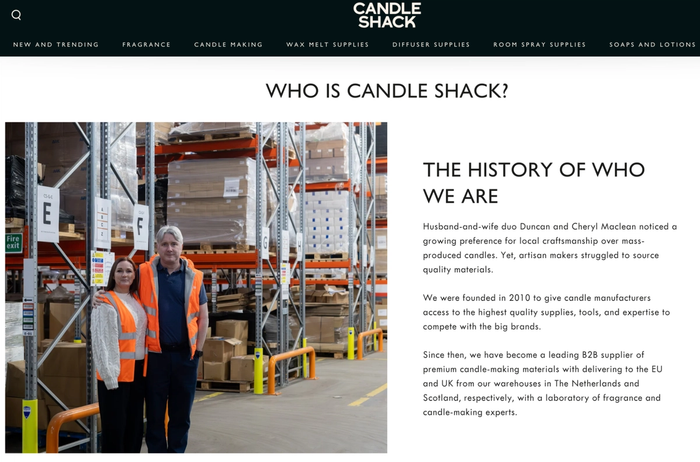
Offer
Your product or service pages should clearly communicate your value. Instead of just listing features, focus on the benefits and uniqueness of what you offer. Use engaging, benefit-driven language to explain why visitors should choose you over competitors. If possible, add comparisons, use cases, or testimonials to reinforce your positioning.
❌ Bad USPs
"High-quality products at the best prices."
→ Too generic – every brand claims this, and it doesn’t differentiate your offer.
"We offer great customer service."
→ This is expected, not a unique selling point. What makes your service better than others?
"Our software is easy to use."
→ "Easy to use" is subjective. Without specifics, it doesn’t convey real value.
✅ Better USPs
"Eco-friendly candles that burn 30% longer than standard brands – crafted with natural wax and essential oils."
→ Highlights a unique benefit (longer burn time) and appeals to eco-conscious buyers.
"24/7 customer support with a 10-minute average response time – because you deserve fast, human help when you need it."
→ Quantifies the benefit and reassures customers with a specific response time.
"No-code website builder: Launch your online store in 30 minutes – without hiring a developer."
→ Specifies exactly how fast and easy it is, making the value clear to potential users.
Contact
Is it easy for visitors to reach you? Ensure that your contact section is simple to find and user-friendly by offering multiple ways to get in touch – such as a contact form, email address, or phone number.
Paper Source makes it easy for customers to find and connect with them. They list their address, hours, contact info, and even their Instagram for quick access. They also include a photo of their storefront, so if you’re walking by, you’ll know exactly what to look for:

Now, pick the website builder for your small business
Choosing the right website builder is one of the first steps toward establishing a professional online presence that supports business growth. With easy-to-use design tools, SEO features, and integrated e-commerce options, these top website builders offer everything a small business needs to create a polished, accessible website that reaches customers and drives sales.
But a website alone isn’t enough. Take your business to the next level with Capsule CRM! Capsule helps you build stronger customer relationships, track leads, and organize tasks with ease. Try it free for 14 days to streamline operations, boost customer satisfaction, and fuel sustainable growth.




